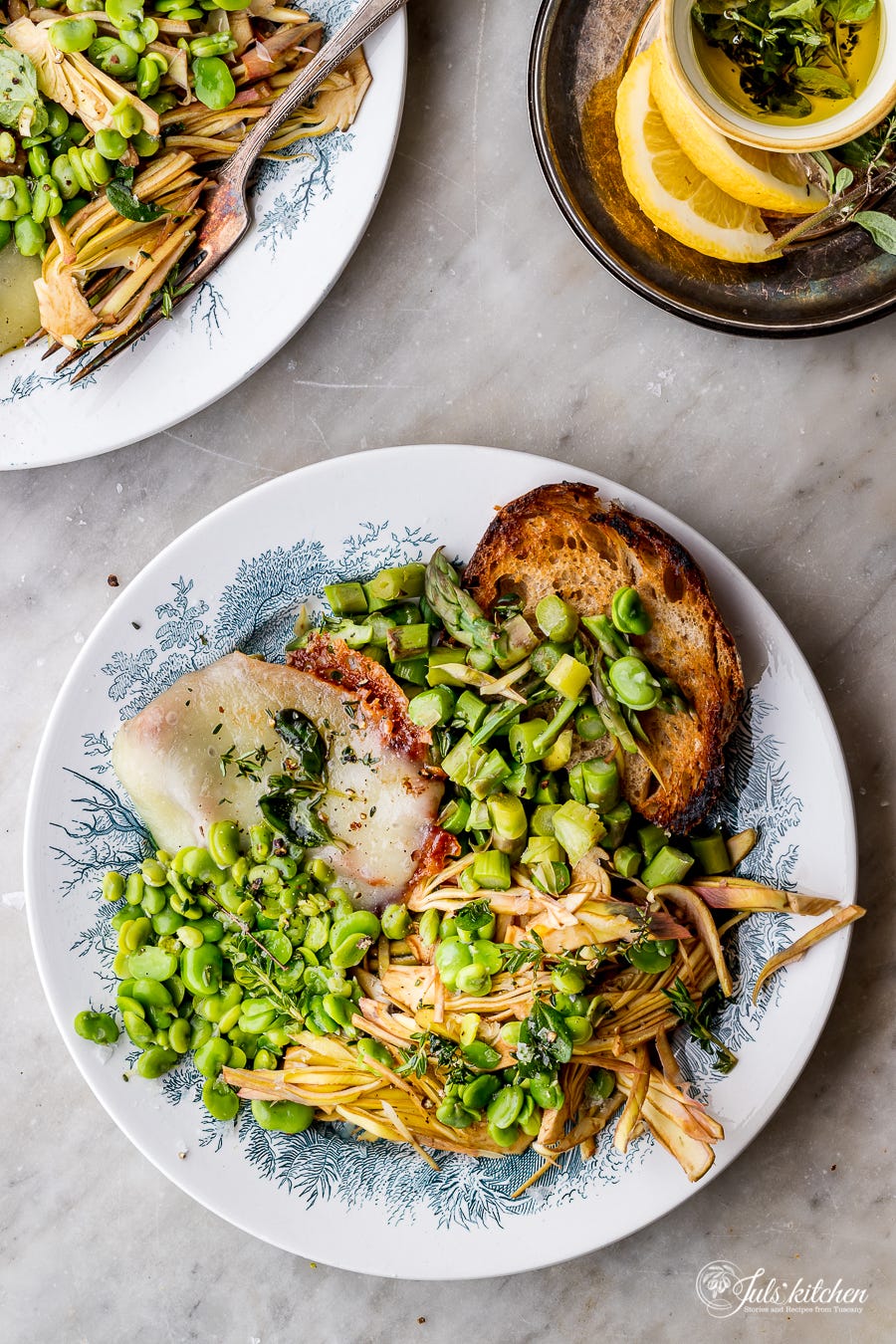The weekend cooking project: warm Spring vegetable salad
A spring salad with artichokes, fava beans, asparagus and grilled cheese. Will you make it over the weekend and accept the challenge?
I hope you haven't gone shopping yet because I have a new recipe for you! There is a new project I would like to tell you about: the weekend cooking project.
Starting this week, you will receive an email from us every Friday morning with a recipe to make over the weekend. It could be an old recipe from the blog archive, where we have more than 500 recipes, or a new blog post. There will be baking ideas and quick salads, stews and focaccias…
Will you accept the challenge?
If you decide to take part to the weekend cooking project, share the results with us on social media by using the hashtag #myseasonaltable and tagging @julskitchen on Instagram. It will be a way to shorten the distance in this time of social distancing.
The recipe we have chosen for this week's cooking weekend project is a warm spring vegetable salad, made with artichokes, fava beans and asparagus, with a slice of grilled cheese and some toasted bread.
I asked for your help on Instagram to decide which name to give to this salad. This recipe has been in the blog archive for almost a decade now, but it has been scarcely visible. And this is a pity, as this recipe is the celebration of spring in a plate. I love it, and it has been a hit during the cooking classes for years.
We recooked the recipe, took new pictures and gave a fresh look to the post. Now it is ready to receive some love and attention.
Warm Spring vegetable salad with grilled pecorino cheese
This is a warm Spring vegetable salad, made with with artichokes, fava beans, and asparagus, served with grilled pecorino cheese, a slice of toasted bread and a lemony citronette. In the blog post you can also read some musings about the power of words, and how seductive they can be, even in choosing a cookbook. Read the blog post here.
Have a look to our new reel on Instagram to see how to clean and slice the artichokes.
If you have questions about the ingredients or the recipe, if you have a special request for one of the next cooking projects, or if you just want to have a chat, just reply to this email.
If you are a subscriber, don’t worry! We just moved our subscription-based newsletter where we share original recipes each week to Mondays. So stay tuned for a fresh, verdant, seasonal lasagna next Monday!
Are you interested in more original recipes?
So you should consider subscribing. If you join the subscription-based weekly newsletter every Monday you’ll receive an email with a new recipe.
What you missed this month: beef, sausage and asparagus meatballs, a fava bean, salami and pecorino ciambellone, a Tuscan Easter menu and a seafood recipe for Good Friday, and a recipe to make porchetta at home.
If you join us, you will receive a new original recipe inspired by ingredients, season, or tradition every week. You will discover Italian classics, weeknight ideas with an Italian flair, reliable dishes to add to your cooking repertoire.
Subscribing to the newsletter, you will support us directly. Whenever you decide to join us, you will have complete access to the whole archive of already published recipes and stories.
We love Letters From Tuscany as it is like having our own independent publication: we test, photograph, write each recipe just for you. It is a way of sharing great content, recipes that we like, created to inspire you, to bring a little taste of Italy to your kitchen, for you and your family.
To better explain why we launched this project, you can read this article: Can Small-Scale Subscriptions Change Food Media for the Better? It says:
“By necessity and by choice, writers and other creators are leaning on platforms where devoted followers can support them directly, instead of putting all their effort into traditional distribution models like newspapers or magazines. Creators gain a sense of creative control and more appreciation for their labor. Consumers find a personalised experience with more transparency; they’re supporting individuals, not institutions.”




